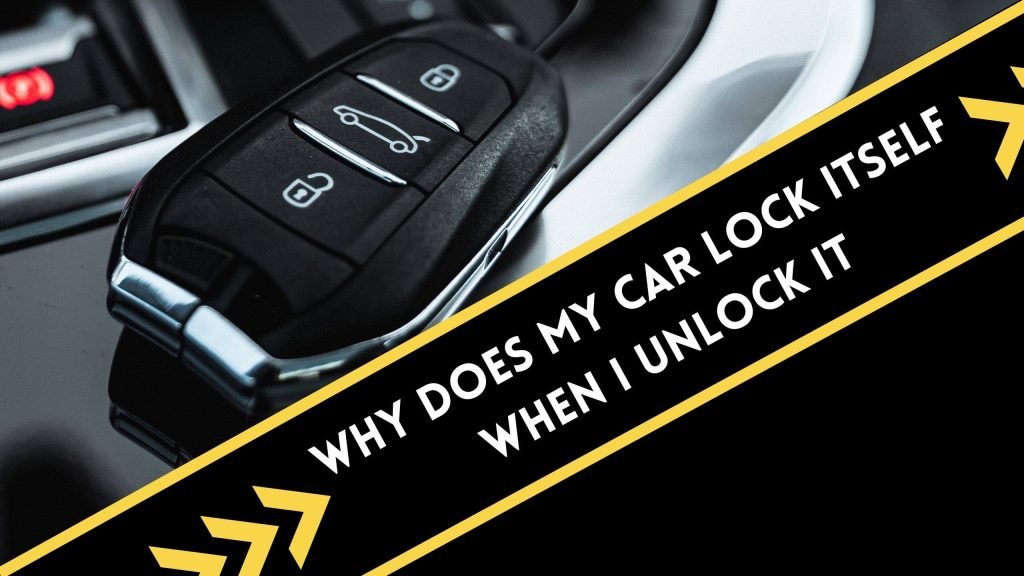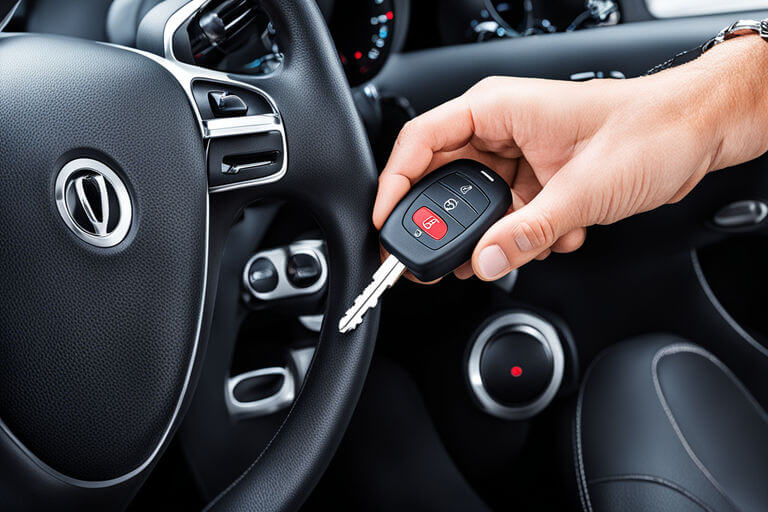Car’s Problem: Unlocked One Second, Locked the Next? Here’s Why!

Imagine this: you approach your car, key fob in hand, happily press the unlock button, and… nothing. Or worse, the locks flicker open and then snap shut again, leaving you bewildered. Don’t worry, this isn’t a scene from a quirky sci-fi movie. Many car owners face the frustrating situation of their car seemingly having a mind of its own when it comes to locking and unlocking.
Fear not, fellow driver! This article dives into the common reasons why your car might be playing hide-and-seek with its locks and provides solutions to get you back in control.
Faulty Key Fob or Dead Battery
The most common culprit behind erratic locking behavior is your key fob. These handy devices send electronic signals to your car’s receiver to lock and unlock the doors. Here’s how a faulty fob can cause issues:
- Dying Battery: A weak battery in your key fob might not transmit a strong enough signal, leading to the car not recognizing the unlock command, or the signal being misinterpreted.
- Stuck Button: Constant use can cause the unlock button on your fob to get stuck in a depressed position. This might send continuous signals, leading to the car locking and unlocking rapidly.
- Damaged Fob: Physical damage to the fob’s internal components can disrupt its functionality.
Solutions:
- Replace the Battery: Start by replacing the key fob battery with a fresh one of the exact recommended type. Check your car’s manual for specific battery details.
- Clean the Buttons: Use a can of compressed air to gently remove any dust or debris that might be hindering the buttons’ proper operation.
- Reprogram or Replace the Fob: If replacing the battery and cleaning don’t solve the problem, consult your car’s manual or a qualified mechanic to see if the fob needs reprogramming or replacement.

Glitchy Door or Trunk Sensor
Modern cars rely on a network of sensors to determine if doors, the trunk, or the hood are properly closed. A malfunctioning sensor can send false signals to the car’s computer, tricking it into thinking a door is ajar. This safety feature prevents you from accidentally locking your keys inside, but it can also lead to the car unlocking and then immediately re-locking due to conflicting information.
Solutions:
- Identify the Problem Door/Trunk: Pay close attention to see if there’s a specific door or the trunk that seems to be triggering the re-locking behavior. Often, a faulty door switch might not show the dome light staying on as usual when the door is closed.
- Clean the Sensor: Dirt or debris around the sensor can interfere with its operation. Locate the sensor (usually on the door jamb or trunk latch) and carefully clean it with a soft cloth.
- Mechanic Visit: If cleaning doesn’t help, a mechanic can diagnose the specific sensor issue and recommend repair or replacement.
Body Control Module Blues
The body control module (BCM) is the car’s brain for electrical systems, including door locks. A malfunctioning BCM can send erroneous signals, leading to all sorts of electrical gremlins, including unexpected locking and unlocking.
Solutions:
Unfortunately, diagnosing a BCM issue usually requires specialized tools and expertise. If the simple solutions above don’t fix the problem, it’s best to consult a qualified mechanic who can diagnose the BCM and recommend repairs.
Other Potential Causes
While less common, a few other factors can contribute to automatic re-locking:
- Aftermarket Alarms: Improperly installed or malfunctioning aftermarket alarm systems can interfere with the car’s original locking mechanisms.
- Software Glitches: In rare cases, software glitches in the car’s computer system might lead to locking issues. Consult a mechanic to see if a software update is available for your car model.
Keeping Your Locks Under Control
Here are some preventive tips to minimize the chances of your car playing locking games:
- Avoid Leaving Key Fobs in Direct Sunlight: Extreme heat can damage the fob’s internal components.
- Invest in a Fob Case: A protective case can shield the fob from bumps and scratches.
- Keep Your Car’s Electrical System Healthy: Regular maintenance and addressing any electrical issues promptly can help prevent broader problems like BCM malfunctions.
By understanding the common reasons behind your car’s locking quirks and following these tips, you can get back to enjoying smooth, predictable lock operations. Remember, if the problem persists, a qualified mechanic can diagnose the specific issue and get your car’s locking system back in sync.
FAQ.
Q1: My car unlocks with the fob, but won’t lock again. What could be wrong?
This situation can arise from a couple of potential causes:
- Faulty Door or Trunk Sensor: As mentioned earlier, a malfunctioning sensor might signal the car’s computer that a door or the trunk is ajar, preventing the locking mechanism from engaging. Follow the steps mentioned in the article to identify the culprit door/trunk and try cleaning the sensor. If cleaning doesn’t solve it, a mechanic visit is recommended.
- Key Fob Issue: While less likely, there’s a chance your key fob itself might be malfunctioning specifically with the lock function. Try using the spare fob (if available) to see if the locking function works there. If the spare fob works, you might need to reprogram or replace your original fob.
Q2: My car randomly locks and unlocks itself. What’s happening?
This erratic behavior often points towards a faulty key fob with a stuck button continuously sending lock/unlock signals. Replacing the fob battery and cleaning the buttons are the first steps. If the problem persists, consult a mechanic to explore fob reprogramming or replacement options.
Q3: Is there a way to disable the automatic re-locking feature?
Unfortunately, disabling the automatic re-locking feature typically isn’t an option on most modern cars. This safety feature is designed to prevent accidentally locking your keys inside the vehicle. However, some car manufacturers might offer a setting to adjust the time delay for automatic re-locking. Consult your car’s owner’s manual to see if this functionality is available for your specific model.
Q4: How much does it cost to fix a car locking issue?
The repair cost depends on the root cause of the problem. Replacing a key fob battery is a relatively inexpensive fix. Sensor cleaning might be manageable on your own, but repairs or replacements could involve labor costs. Diagnosing and fixing a BCM issue can be more expensive due to the complexity involved. It’s always best to consult a mechanic for an accurate estimate based on your specific situation.
Leave a Reply